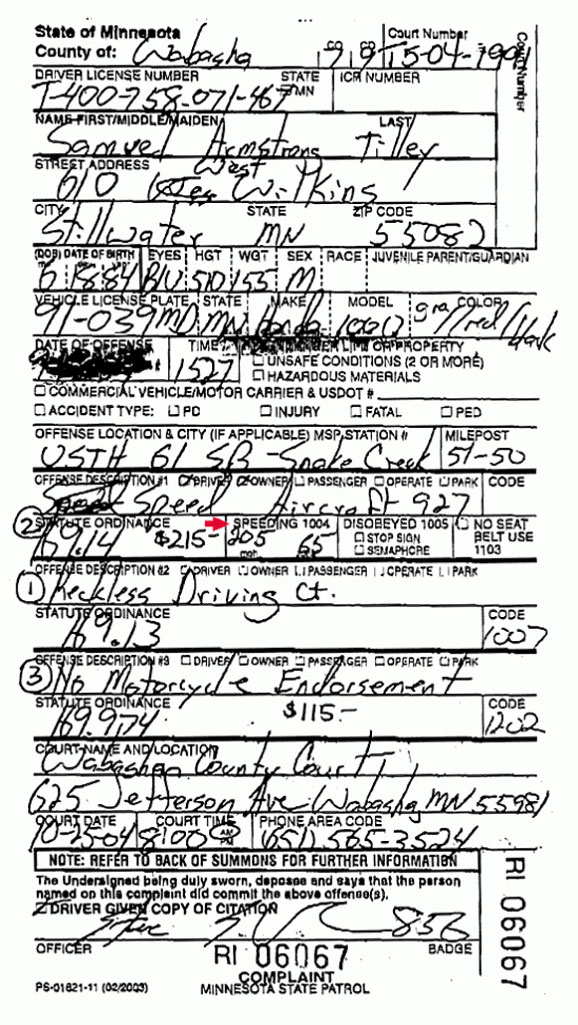

#Speeding ticket in mn license#
In some instances, you may receive a limited license following a suspension or revocation that allows you to drive to certain vital destinations, such as work and rehab, during a reasonable window of time before you are scheduled to arrive and after you are scheduled to return. Your license suspension or revocation period can also be extended. Both suspended and revoked licenses rescind your driving privileges for a certain period of time – and if you are caught driving while your license is in one of these statuses, you will be charged with a misdemeanor, resulting in up to 90 days of jail time and up to $1,000 in fines. The DPS will can suspend your license from 30 days to one year if you have repeated traffic violations, and can revoke it if you have repeated misdemeanor or gross misdemeanor violations.
#Speeding ticket in mn drivers#
Driving on a Revoked/Suspended Licenseĭriving in Minnesota is a privilege that can be rescinded if the Department of Public Safety (DPS) believes you to be a safety risk to other drivers following a misdemeanor or felony conviction. If you wish to avoid jail time and/or the maximum fine, you should always call attorney with experience defending clients accused of traffic crimes. Misdemeanor speed violations, while “lesser” crimes, are still crimes and can go on your permanent record. Racing on any public road – regardless of whether or not you exceeded the speed limit – is also a misdemeanor, as is a third speed violation within 12 months or a fifth within 24 months.
#Speeding ticket in mn driver#
This includes “careless driving,” in which the driver thoughtlessly disregarded the rights or safety of others (including passengers in the vehicle) or the safety of other people’s property, and “reckless driving,” in which the driver willfully and wantonly disregarded such safety. Misdemeanor speed violations include any instances in which your actions endangered another person or property, according to the judge’s assessment. However, speeding under certain circumstances or to certain degrees can make you guilty of a misdemeanor or gross misdemeanor, for which you can receive up to 90 days in jail, a fine of up to $1,000, and/or a license suspension or revocation. Such a violation is rarely considered a crime, and thus legal representation is seldom needed. Paul is exceeding the posted speed limit. If you’re been accused of a traffic offense and you’re unsure whether or not you should hire an attorney or fight the charge yourself, read on to discover the details of your charge, including when legal help is advisable. Violations that make you a substantial risk to others on the road, such as multiple DWI convictions, can be felonies, which almost always require the help of an experienced lawyer to avoid or minimize prison time and to help you get your license back. These are both considered crimes and can result in jail time, stiff fines, and possible license suspension, revocation. Some more serious moving violations, however, are classified as misdemeanors or gross misdemeanors. Fighting these charges is seldom worthwhile and since no crime has been committed, you rarely need an attorney.

Most standing and many moving violations are considered petty misdemeanors, which are not crimes, but rather violations of local statues, such as double parking and simple speeding tickets. The answer to this question depends, in large part, on how your charges are classified. Traffic offenses are among some of the most confusing crimes for which our clients face charges – not because of their severity or difficulty, but because many people are uncertain when to hire an attorney, when to fight charges themselves, and when to simply pay the imposed penalty.


 0 kommentar(er)
0 kommentar(er)
